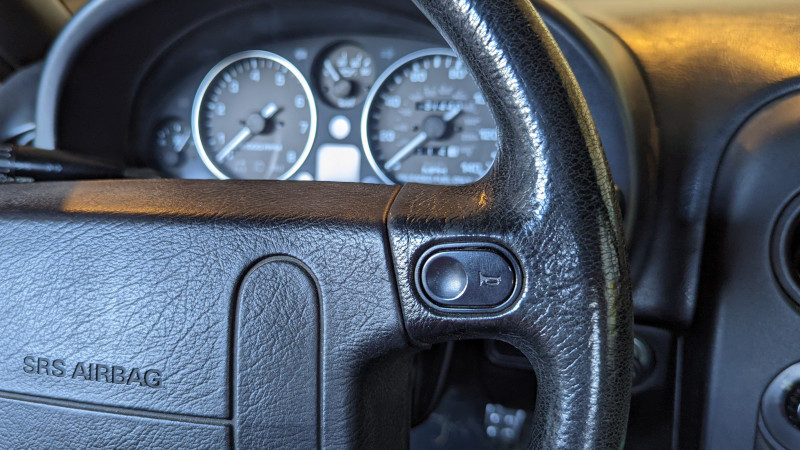If you’ve ever been to a major city, you know how people can be pretty generous with their horn. Sometimes people honk because they’re bored, angry, or because they want to get another driver’s attention.
Reasons For Honking
Honking can be a major distraction when used incorrectly, but it could save someone’s life. All vehicles are required to have a horn in order to be considered street legal.
If you’re not sure when it’s considered OK to honk, here are some examples when you might be justified in honking at someone else.
Sponsored Links
1) Avoiding a Collision
The best reason to honk your horn is when you’re trying to avoid an imminent collision. This is the primary purpose of the horn. The following are examples of scenarios you may encounter that would warrant a blast of the horn.
You’re In a Blind Spot
If you’re in someone’s blind spot and they start to change lanes into you, it’s appropriate to sound your horn to let the other driver know you’re there. This is especially true if you don’t have room to move out of the way.
Not all drivers adjust their mirrors correctly. If you’ve been driving next to another vehicle for a while, they may even forget you’re there. This is particularly true for smaller vehicles, which can easily hide in the blind spots of larger ones.
You Can’t Stop
There are some scenarios where you may not be able to stop before you reach another vehicle. Perhaps your brakes have failed, or another driver may have pulled out in front of you slowly while you’re towing a heavy load. Fully loaded trucks can’t stop on a dime.
Sponsored Links
If you don’t have time to stop, sometimes all you can do is sound the horn and hope for the best. In some cases, there may be enough time for the other driver to move out of the way.
2) Someone Else Is In Danger
Even if you’re not in danger of crashing, you may be able to save someone else from a collision by honking your horn.
Perhaps you notice a pedestrian crossing when they shouldn’t, or you see a vehicle that’s about to blow through a red light. If you sense impending danger, sounding the horn is a great way to get everybody’s attention and have them double check their surroundings.
3) Backing Up
If you’re backing up in a congested area, giving a couple short blasts of the horn is a great way to let everyone around you know that you’re starting to move.
Sponsored Links
When you’re backing up, you often don’t have great visibility to the sides. It’s particularly important to state your intentions when there is a high concentration of pedestrian or bicycle traffic. You’ll notice that many auto repair shops ask technicians to honk when entering or exiting a work bay.
4) The Light Turned Green
Sometimes during a long red light, other drivers will get side tracked or distracted with something in the car. It could be their kids, their infotainment system settings, or they may just zone out while they wait for the light to turn green.
If you notice the light turn green and the driver at the front hasn’t noticed after a moment passes, it’s OK to give a short blast of the horn to let them know it’s time to move. Sitting through an extra light cycle could impede traffic flow at that intersection.
Reasons Not To Honk
For every valid reason to honk, there are several reasons you shouldn’t. Here are some cases where it’s best to just exercise a bit of patience instead.
Sponsored Links
1) You’re Frustrated
Getting stuck in traffic is no fun, but honking won’t clear up the congestion. If you’re frustrated about traffic, try to find something to do that occupies the time. This could be your favorite music or a new podcast that catches your interest. Sometimes trying to solve a challenging problem from work can be a great way to make the line seem to move faster.
If you’re running late, try leaving a greater margin next time before your next appointment. Traffic incidents, weather, and road construction commonly delay travel times by minutes or even hours in some cases.
2) Punishing Another Driver’s Mistake
There’s not a single driver on the road who hasn’t made a mistake at some point. It’s inappropriate (and sometimes illegal) to use the horn to punish another driver’s mistake.
If someone cut you off or pulled out in front of you, try to give them the benefit of the doubt. They may not have done it on purpose. Honking out of anger comes with the possibility of escalation to road rage, which is extremely dangerous for everyone involved.
Sponsored Links
It’s important to keep a level head while driving and not dwell on the mistakes of others. You can only control your own actions, so do your best to drive defensively.
3) Not Turning Right on Red
Try not to honk at drivers for not turning right on red. Although it’s legal at most intersections in the US, the driver ahead of you may not be able to see oncoming traffic.
Remember that the driver in front will have a different viewing angle of cross traffic than you do. They may be driving a lower vehicle with worse visibility. Honking may compel the other driver to pull out when it is not ideal to do so.
4) Yield Signs
A yield sign in your lane means you do not have the right of way when there’s a car coming from the other lane. If the driver ahead of you decides to wait at a yield sign for the other car to proceed, they have every legal right to do so.
Sponsored Links
Conclusion
Although honking can often be perceived as a nuisance that startles drivers, there are many valid reasons to use your horn. Remember that horns are legal requirements, and there are completely valid reasons to use them.


Hi-In some cases, honking at wildlife is a very bad idea. You might want to qualify your statement that if there are several animals in the road, honking could make them scatter into other lanes or even run toward you. I would suggest you add that to reasons you should not honk.
http://www.wildaware.org
Christie Greene, Founder and President
You’re right, each encounter with wild animals in the road is highly situational. Your best options for collision avoidance will vary, depending on the road conditions, your speed, how far away the animal is when you see it, and the traffic around you.
I had an RV blew his horn at me when I was forced to slow down at a Constuction on a highway. .When it comes to flaggers.
Is it a misdomenor to honk your horn when you go over a speed bump that has been placed on a main road?
I don’t think that would be a misdemeanor in the United States, though I could see one getting a ticket for honking unnecessarily. Check your local laws to be sure.